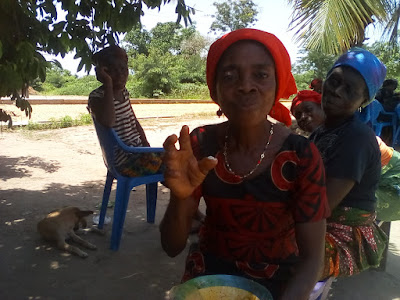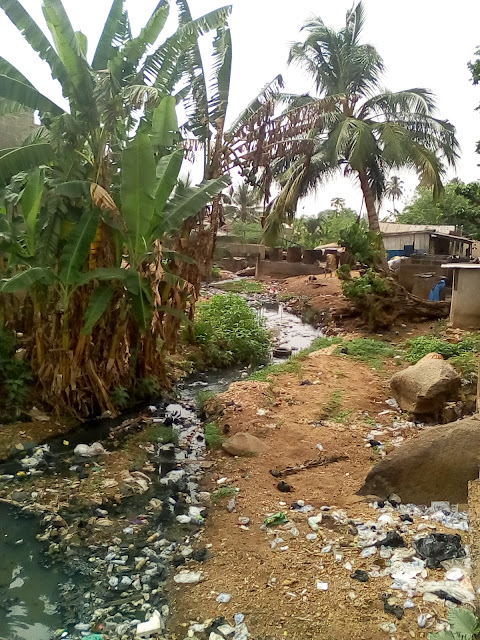Ghana isn't "poor," and neither am I.
Some of my friends and neighbors making gari, an extremely popular food made from cassava.
It is difficult, sometimes, for me to share my experiences as a Peace Corps volunteer knowing that for many people, I'm their main source of information for what life in Ghana as like. I know that many of my friends and family extrapolate and assume that what is true for me is likely true for all Peace Corps Volunteers, or all Ghanaians, or all Africans.
 |
| Here are some of my friends and neighbors hard at work making garri, one of the most popular foods in my town. |
I would like to take a brief moment to correct that and let you know that Ghana isn't poor. Neither am I, and neither are Peace Corps Volunteers in general.
Let's start with me, since that's the easiest assumption to correct. In USD, our "salary" is a pittance. I could make more in a week at a minimum wage job in the United States than I live off in Ghana in a month. But that doesn't mean I'm living in poverty here. On the contrary, the money I am given is little less than the salaries professionals make in this part of town, and it's more than the vast majority of people in my village live on. I can afford healthy food, a new outfit most months, drinks with friends, and the occasional meal out. It's not unheard of for PCVs in Ghana to save up money to vacation to other countries in the region, and many people enjoy mini-getaways to the beaches here in Ghana. Personally, I've enjoyed a trip to Accra, the national capital, where I had enough money to go see Wonder Woman and enjoyed dining out with friends.
 |
| I even got together with a couple of other PCVs to make this extremely delicious Thanksgiving feast! My camera work may not be the best, but the meal was excellent. |
Ghana isn't poor, either. In fact, it's one of the wealthier countries in Africa as measured by the Human Development Index, which takes into account health, education, work opportunities, and human security, among other things. A few weeks after I arrived in Ghana, I heard a Peace Corps staff member describe Ghana as a "West-African powerhouse," and that statement is fitting in so many ways. Ghana is considered to be a "middle-income" country. It's one of the most stable democracies on the continent, and it's an example for other countries in many ways.
The wealth in Ghana is not particularly visible where I live, but if you travel to Accra, you'll see people hopping in taxis to go to the mall, or heading to the grocery store to buy dog food for their family pets. Infrastructure and the way people live their lives may look different from life in the USA, but people are still worrying about their grades and trying to get promotions at work.
The first time I visited Accra, it nearly made me feel light-headed. I bought clothes in a store that was pretty much a clone of Forever 21, rubber-necked billboards on the sides of highways, and ordered popcorn at the movie theater. It baffled me that these things could exist in the same country as my community, which doesn't have latrines, running water, or a school.
Now that I'm home in America (just visiting for Christmas), I struggle with how to make people understand that both sets of realities are true. I sometimes feel I can't tell my fellow Americans about the real struggles that people face in my community. I am afraid that rather than hearing the stories I am trying to tell, about the specific struggles facing one small group of people, they will generalize and imagine I am talking about all of Ghana, or all of Africa. I might want to say, "People in my town struggle to access nutritious foods," which is true; but they might hear, "All Africans are poor and starving," which is not. I might want to say, "I struggle to connect with people sometimes because of our different backgrounds," which is true; you might imagine I'm saying, "Friendship between Americans and Africans is impossible," which is not.
People have asked me to describe the weirdest thing I've seen, or heard. They want to know what the extremes of life are; I don't blame them, I think a lot of times, the best stories are located at the extremes. After all, there's not much fun in telling someone about the days and hours I've spent hanging out chatting with Ghanaian friends.
And the truth is, I have no shortage of good stories to share. But I'm not always sure that it's right to do so. I feel protective of Ghana, in some ways, and I don't want to contribute to any narratives that make it sound exotic, or strange, or hopeless. Stories that I have gleefully shared with other PCVs are sometimes stored away from my friends at home. I would like nothing more than to share, but I'm worried my anecdotes will end up being retold, prefaced by, "You won't believe this weird thing I heard they do in Africa..."
So here's a little plea for the holidays: if I've shared stories with you, please keep the context in mind. I can only tell you about a very small part of this country, which in turn represents a small corner of Africa. Yes, people are struggling in my community, but hey, Peace Corps has no reason to send volunteers off to the rich part of town.




Comments
Post a Comment